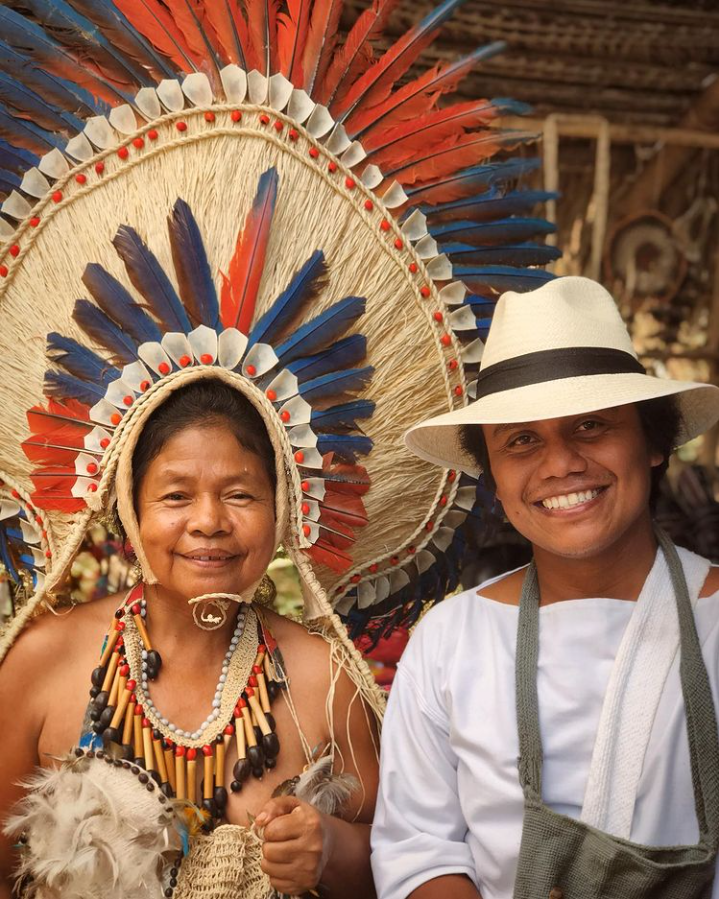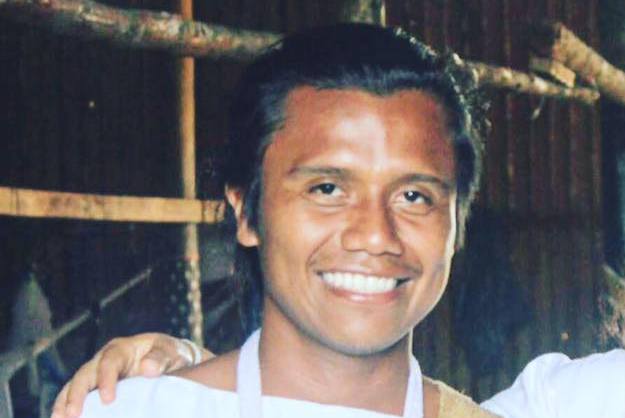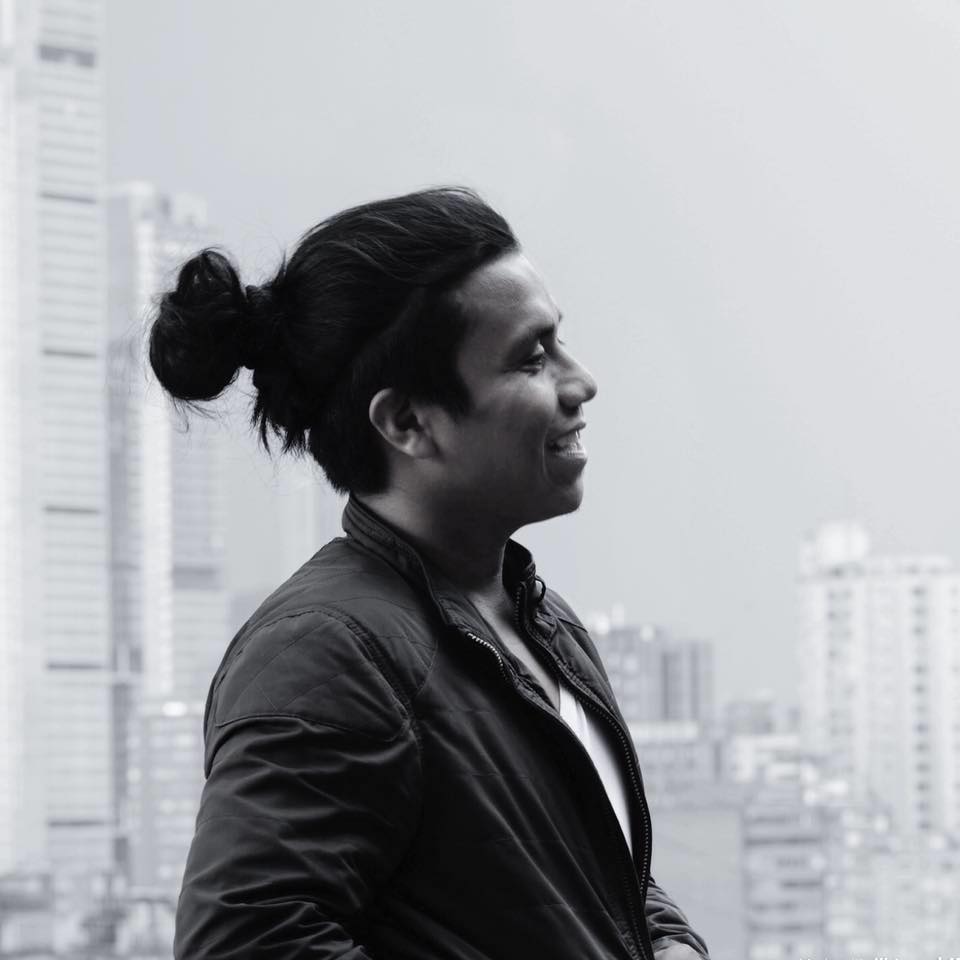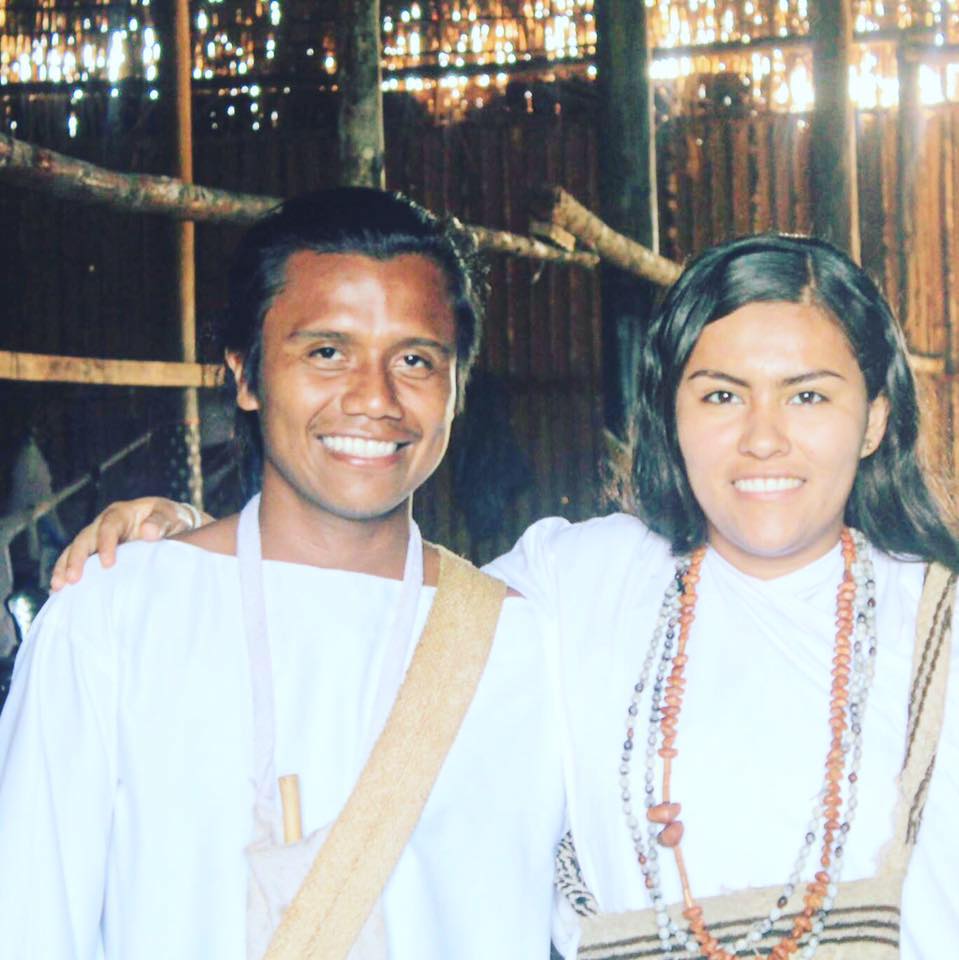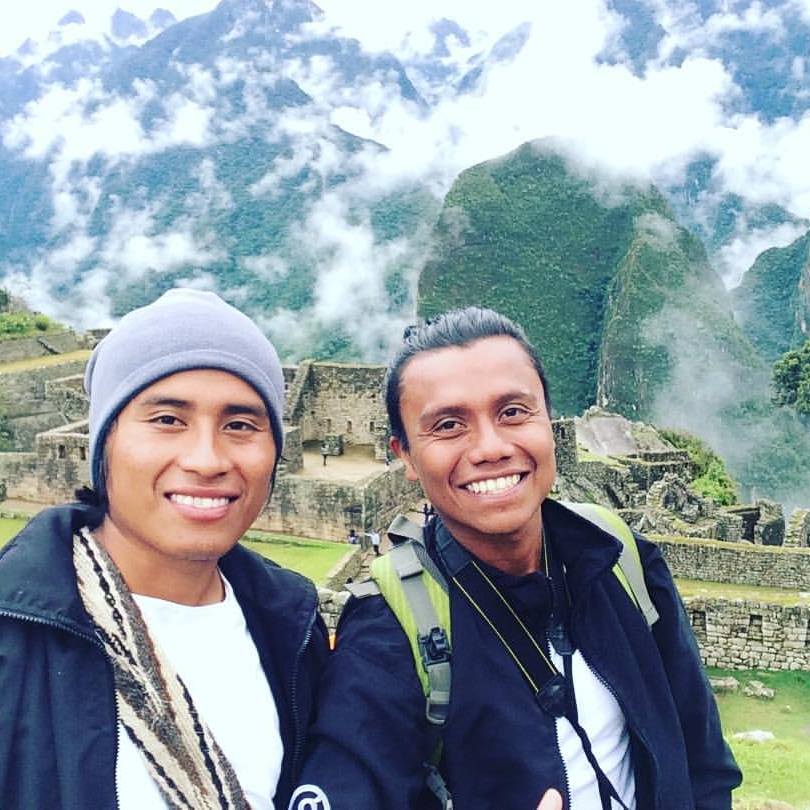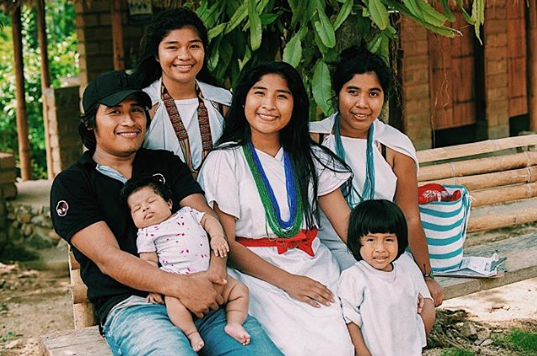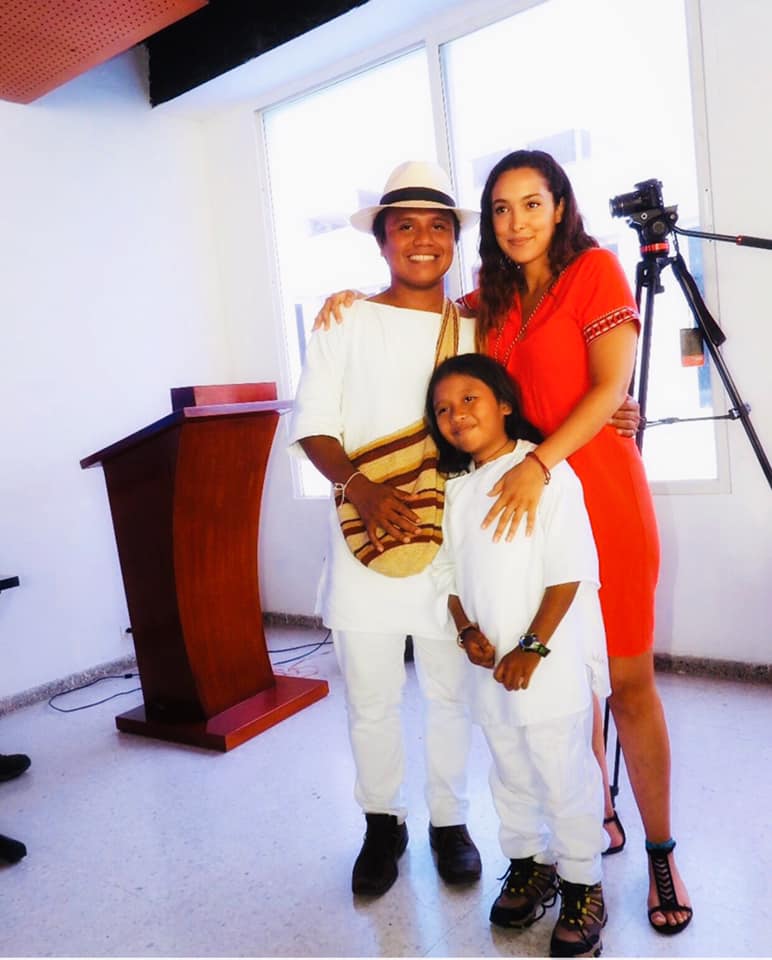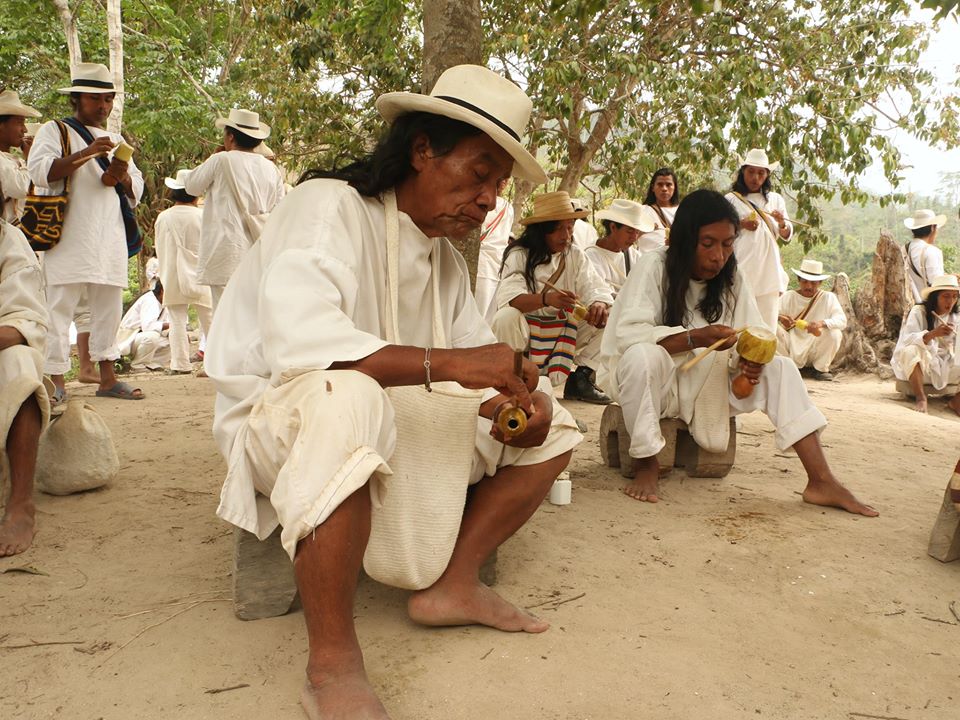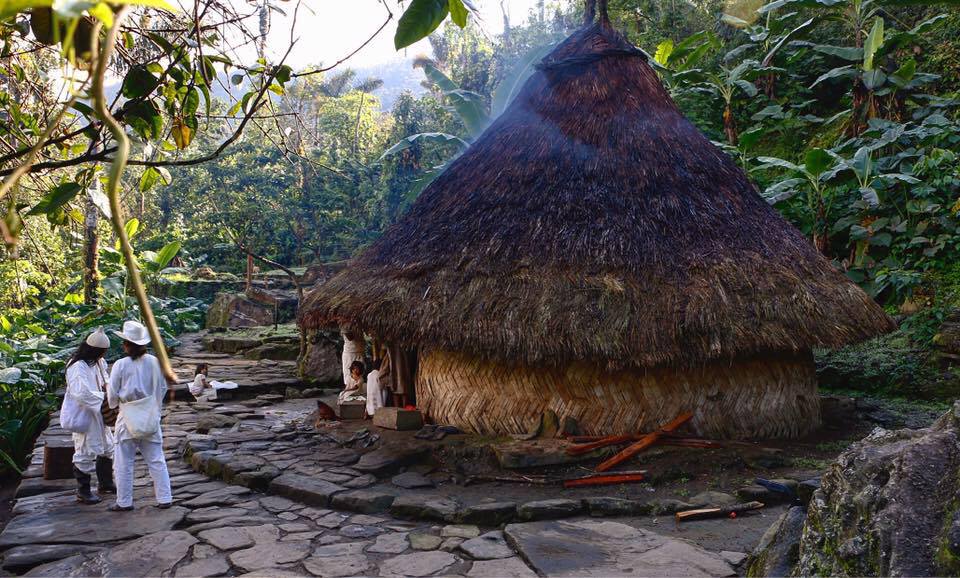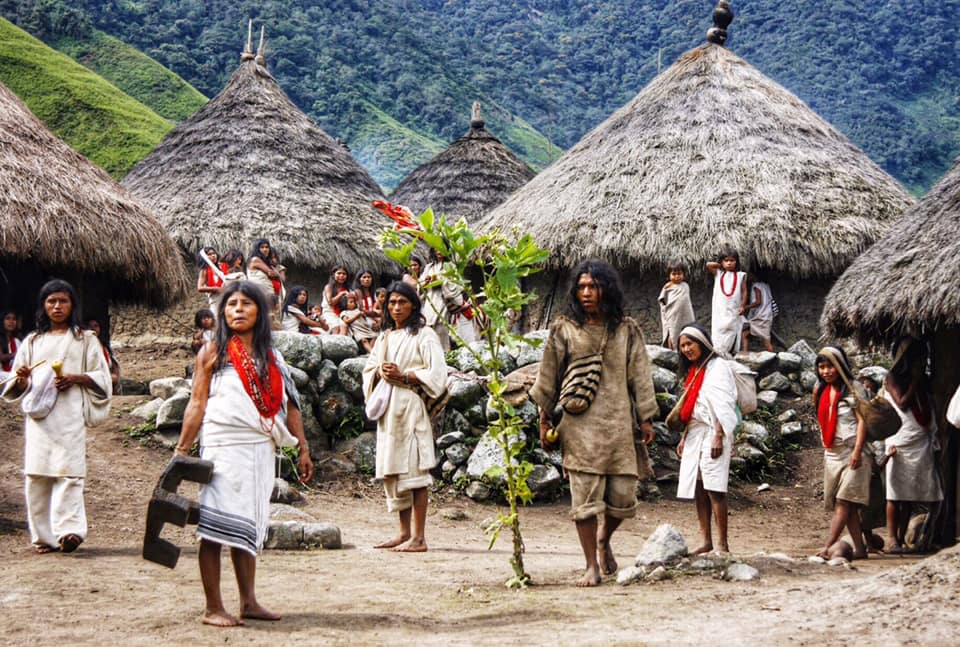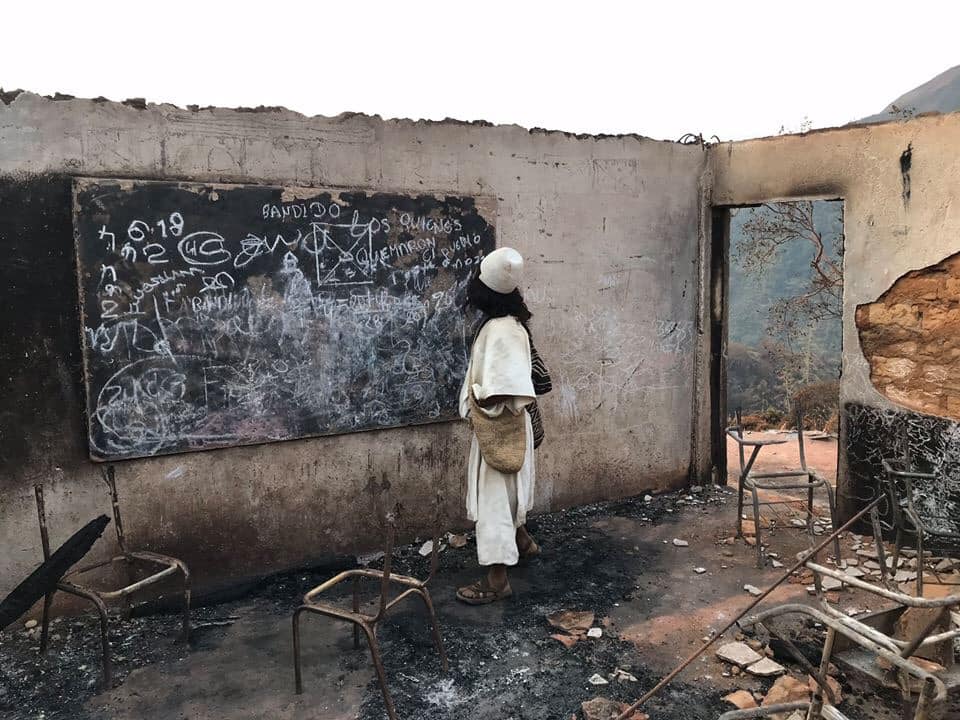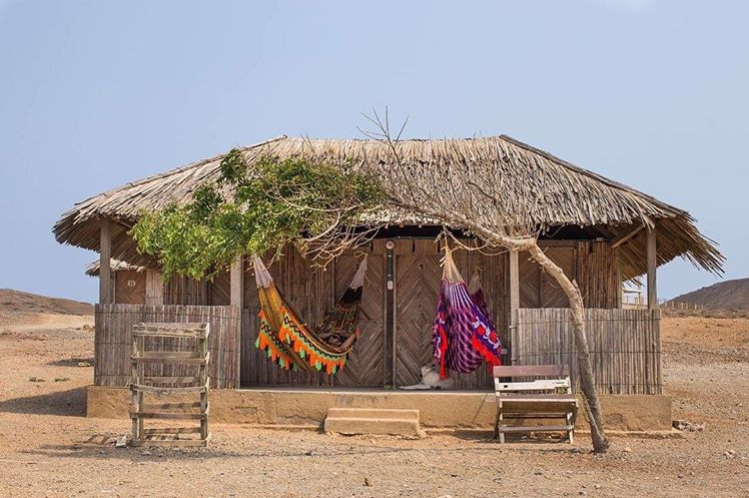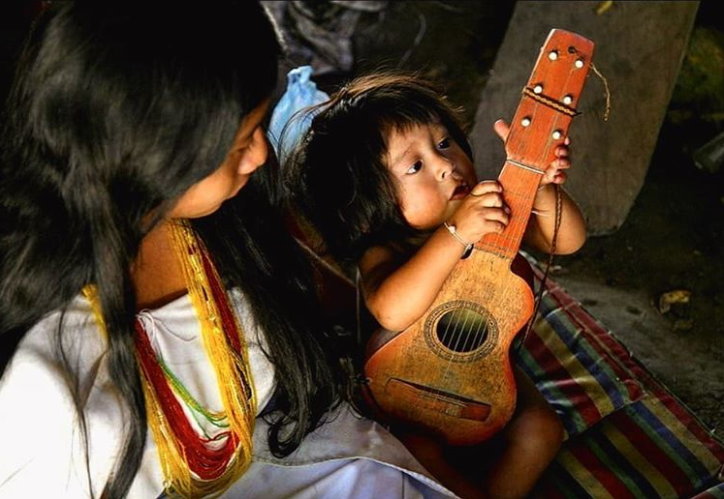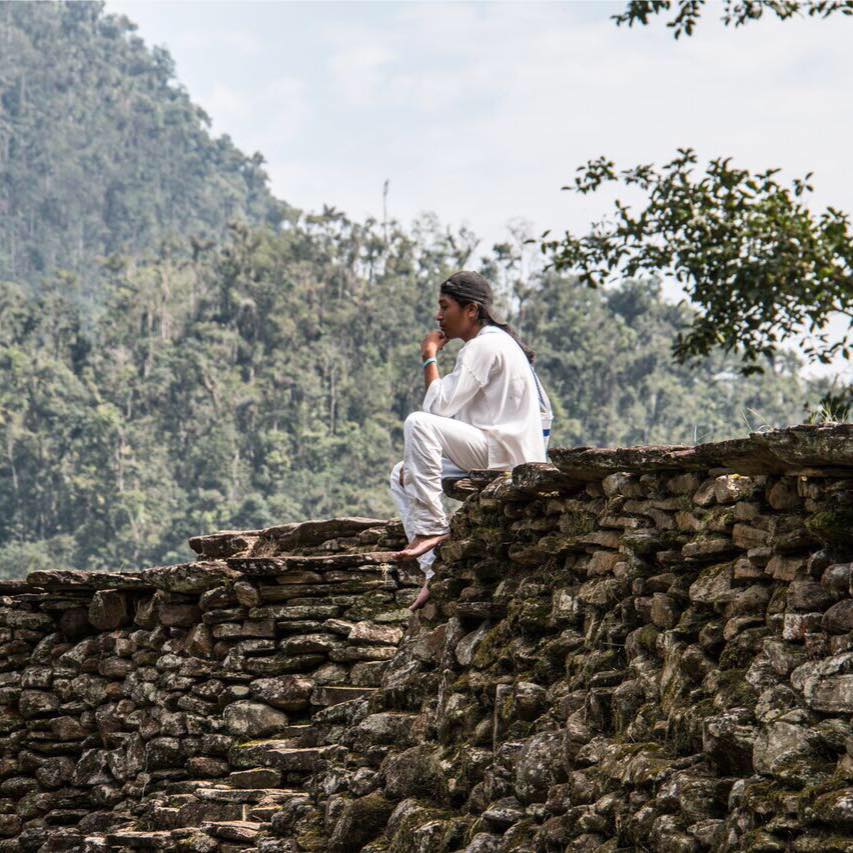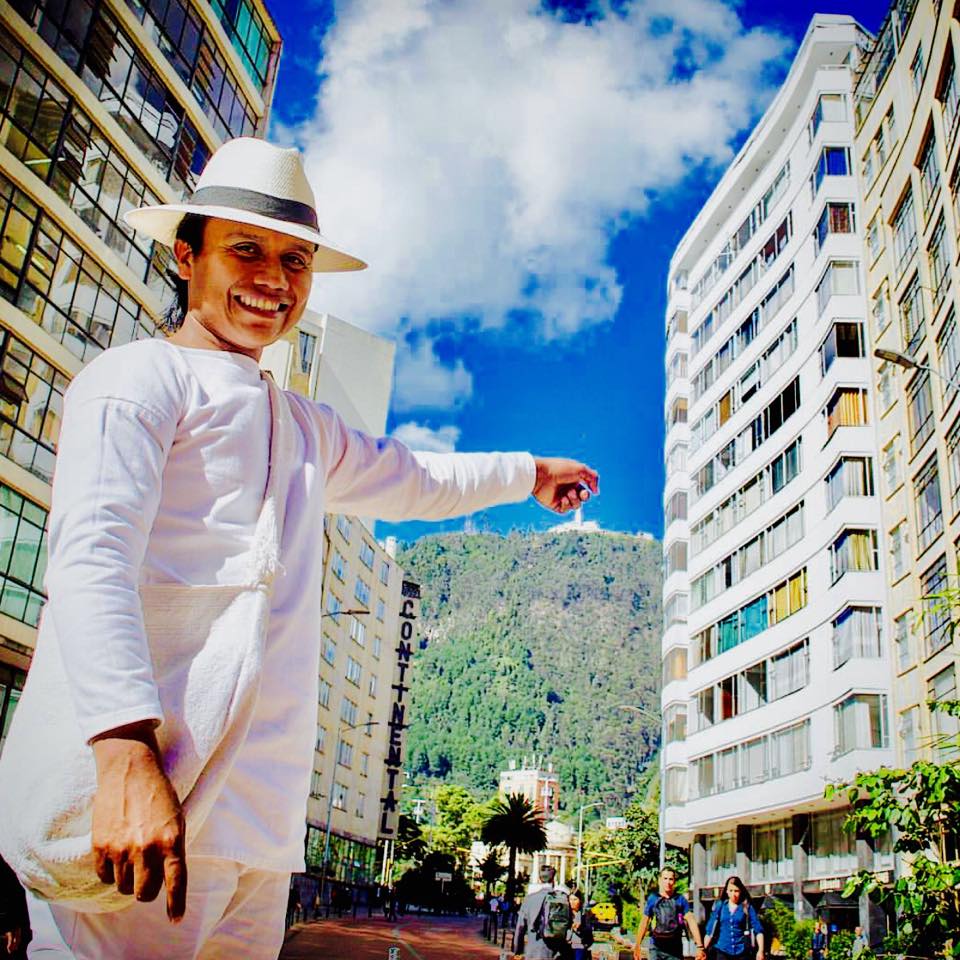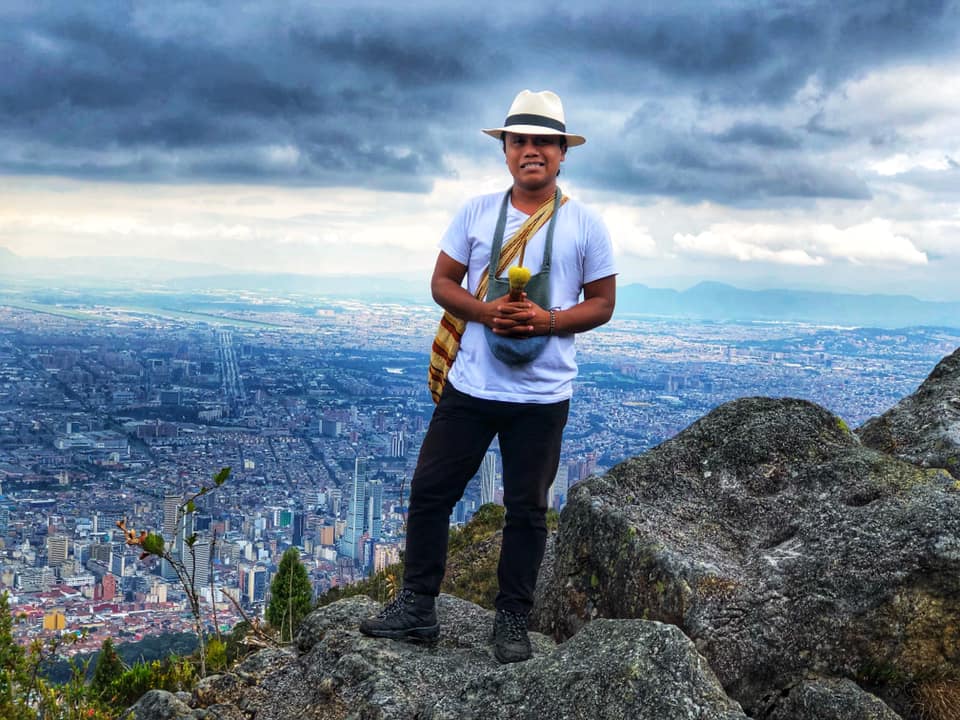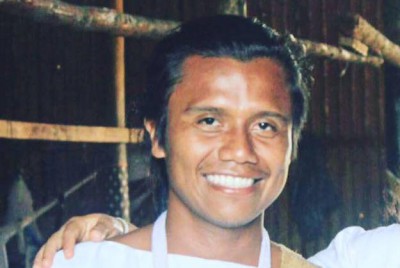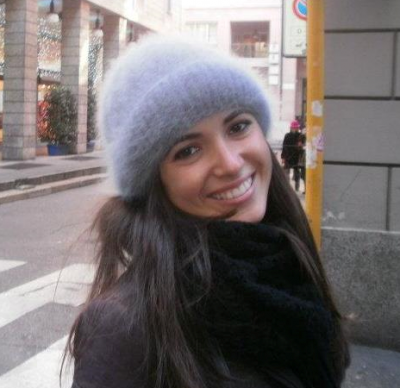Lorenzo Gill’s encounter with the Tikuna in the Amazon: Eudocia & Lorenzo Gill
© 2020 Courtesy of Lorenzo Gill (Sierra Nevada de Santa Marta/Colombia)
COLOMBIA:
Interview with indigenous Lorenzo Gill
Lorenzo Gill
He belongs to the Wiwa and Kogui ethnic group in Sierra Nevada de Santa Marta / Colombia
Director of the Wiwa Foundation
NGO advisor
He studies Sociology at the Externado de Colombia University
Linguist, Poet, Writer, Essayist
&
Çiğdem Gül
The founder of the worldwide “Intercultural Network For The Highly Gifted“
Turkish- based migrant living in Germany
A big fan of First Nations People
Economist
Change Management Consultant & Business Coach for change processes in the company
Journalist & Essayist
In Colombia there are more than 100 indigenous peoples self-recognized as belonging to an ethnic group, of which 65 still retain their own languages, some on the way to extinction for different reasons, from forced displacement, wars in the territories or due to appropriation of the Castilian language as the first language.
Lorenzo Gill belongs to the Wiwa ethical group, located in the Sierra Nevada de Santa Marta, northern Colombia. He is an essayist, poet, writer, linguist, NGO advisor, gives lectures on the indigenous cultures of his country and he studies Sociology at the Externado de Colombia University.
August 31, 2020
INTERVIEW
Çiğdem Gül: Dear Lorenzo, I am very happy that despite the current global coronavirus pandemic you enable me to conduct an interview with you while you are at the other end of the world — in Bogotá / Colombia.
I would like to start our conversation with general questions:
A female non-medical healing practitioner in Germany, who also deals with medicine in distant countries and cultures, told me a few years ago that indigenous people around the world are telepathically connected and can communicate telepathically with one another. They would also know where the other indigenous tribes are geographically located and where they live. They would even know what topics the other indigenous people are dealing with.
Lorenzo, do you have any experiences with such cases? What is your attitute towards this statement?
Lorenzo Gill: Thank you for the interview. In indigenous knowledge, indigenous people and population consider themselves as brothers. That is why the leaders of the Sierra Nevada de Santa Marta refer to themselves as the „Hermanos Mayores“ (Big brothers) and „Hermanos Menores“ (Young brothers) for Western civilization. The idea is that, in the population groups that have not lost that umbilical cord with the planet, these leaders continue to be the Big Brothers. In other words, they are that spiritual, natural and harmonious connection with the planet, both in their praxis and in their ancestral knowledge. As a result, people who remain connected to Mother Earth are able to understand each other perfectly on many areas. I do not know if this happens through telepathy specifically, but through the planet as the source of the connection itself.
Çiğdem Gül: Would you please describe the characteristics of your indigenous culture?
What languages and dialects do the indigenous people of Colombia speak?
Lorenzo Gill: The indigenous people of the Sierra Nevada de Santa Marta are brother communities that descended from the Tayrona civilisation, which was extinct after the Spanish invasion. These 4 indigenous groups are Wiwa, Kogui, Arhuaco and Kankuamos. The special feature of these people is that, in their ancestral knowledge, the Sierra Nevada de Santa Marta is the heart of the world. There is a documentary on this subject by the BBC World: https://www.youtube.com/watch?v=6i81Et6tGrM&t=34s and you can watch it in English too.
Çiğdem Gül: Our „Intercultural Network For The Highly Gifted“ focuses on human rights, peace, the gifted, cultures and minorities worldwide for years. The indigenous people are particularly close to my heart. How does it look in practice when indigenous people from your or another tribe practice the healing of the earth, peace and culture?
Lorenzo Gill: In the new Political Constitution of Colombia from 1991, the indigenous people‘ s rights are recognized for the first time. Thank to this, this we have been able to use these rights to protect our knowledge system, practices, health and so on. There are documentaries about the indigenous people of the Sierra Nevada de Santa Marta that promote harmony, respect and a return to spirituality with the planet. The Earth is a life-giving woman, so it must be recognised as such and we must learn to live with it.
© 2020 Courtesy of Lorenzo Gill (Sierra Nevada de Santa Marta/Colombia)
Conéctame con las cometas,
con la fase de la luna,
con los soles lejanos que como abuelos brillan en la inmensa oscuridad del olvido.
Conéctame con las montañas piramidales,
con la tierra que danza con el sol,
con las plantas que comen de las estrellas,
y yo que me reflejo de entre ellas
Lorenzo Gill
Lorenzo Gill & Lina Marcela Arias © 2020 Courtesy of Lorenzo Gill (Sierra Nevada de Santa Marta/Colombia)
Lorenzo Gill and his brother Machu Picchu in Cusco, Peru.
© 2020 Courtesy of Lorenzo Gill (Sierra Nevada de Santa Marta/Colombia)
Lorenzo Gill´s brother Machu Picchu and his family.
© 2020 Courtesy of Lorenzo Gill (Sierra Nevada de Santa Marta/Colombia)
At the special invitation of the VQTV Foundation and his French friend Mrs. Amel Sawsen, Lorenzo Gill gave a lecture on the current situation of the „indigenous peoples of Colombia“ in Cartagena.
© 2020 Courtesy of Lorenzo Gill (Sierra Nevada de Santa Marta/Colombia)
Çiğdem Gül: Six years ago, as a lecturer at the time, I showed my students a moving documentary film “Brazil in the View of the Conquerors” by Luis Miranda, which was also broadcasted on the well-known French-German TV channel ARTE in Europe in 2011. The documentation enables the descendants of the indigenous people have their say and describe the events of colonization in Brazil from an indigenous perspective. In this context, I am interested in your thoughts, feelings and opinions, whether, and if so, how and why your living space in Colombia is being threatened? It is being tried to be occupied and by whom?
Lorenzo Gill: The consequences of the European invasion are extremely serious. There are currently no exact figures on how many indigenous people were exterminated at the time of the conquest, but the figures range from 40 to 90 million people. In Howard Zinn’s book „A People’s History of the United States“ he reflects this process of extinction, religious submission, ideological imposition and enslavement. If no changes are made, the consequences will exterminate all the indigenous people of the Americas and in the world.
Çiğdem Gül: How do the members of your tribe and you cope with the historic conflicts in your tribal contexts and the conflicts outside of your tribal community?
Lorenzo Gill: We have our own justice system, which does not have to be the same as that of the State. Our justice is more pedagogical and preventive. We know that making a mistake is a way of knowing our reality, and that us why the application of our justice is related to the territory, social and cultural responsibility. No society is exempt from committing errors, crimes or phenomena outside the social norm. Thus, each community has its own system of justice according to its customs.
Çiğdem Gül: Do the indigenous peoples have common rituals that are lived differently locally, but are based on the same spiritual background? Which rituals are lived and how in your tribal community?
Lorenzo Gill: Respecting and recognizing nature as a living entity is very important. As humans we must recognize it, respect it, live with it. That is how different rituals are performed in different communities. But the relationship with nature is the same. The indigenous populations of the Amazon have developed traditional medicine as a way of connecting with Mother Earth. This practice is called „Yajé“. For the indigenous villages of the Sierra Nevada de Santa Marta, it is a matter of recognising it by means of „pagamentos“. These documentaries explain this in depth: Por qué pagamos espiritualmente?
Yajé: ¿QUÉ ES REALMENTE LA AYAHUASCA?
Ade Mamo Ramon Gil, Wiwa community leader and manager of several villages in the Sierra Nevada
© 2020 Courtesy of Lorenzo Gill (Sierra Nevada de Santa Marta/Colombia)
© 2020 Courtesy of Lorenzo Gill (Sierra Nevada de Santa Marta/Colombia)
© 2020 Courtesy of Lorenzo Gill (Sierra Nevada de Santa Marta/Colombia)
© 2020 Courtesy of Lorenzo Gill (Sierra Nevada de Santa Marta/Colombia)
© 2020 Courtesy of Lorenzo Gill (Sierra Nevada de Santa Marta/Colombia)
© 2020 Courtesy of Lorenzo Gill (Sierra Nevada de Santa Marta/Colombia)
Çiğdem Gül: What is the belief of your indigenous tribal community? Can you please tell me about it?
Lorenzo Gill: We believe in Mother Earth, in nature as a living organism that directs and organizes. Nature has a history, it has conflicts, it has needs and our task is to learn to live with it.
Çiğdem Gül: Would you please be so kind and give someone like me, as an European an insight to your life as an indigenous person in the reserve of Colombia and the origins of your indigenous people?
Lorenzo Gill: Europe for me is thought and reasoning, but it lacks much development of spirituality, empathy with the planet and the nature. I could go to Europe to learn more.
Çiğdem Gül: How do you protect your indigenous tribal identity, history, tradition, beliefs and culture? And how is internal, culturally differentiated knowledge passed on within the tribal community? Please give me an example of this.
Lorenzo Gill: Traditionally, all members of my community must transmit the mother tongue, through which the ancestral knowledge, history and identity are also transmitted. Promoting the importance of the indigenous language, the traditions and the principles of being indigenous is part of the legacy of caring for Mother Earth through ancient knowledge.
Çiğdem Gül: What is the significance of head and body decorations and certain clothing for you indigenous people? Are they e. g. a sign of aesthetics or hierarchy or vitality?
Is it that the more one is adorned with these head and body decorations, the more one has access to higher powers?
Lorenzo Gill: In my community we do not use many accessories, but the ancient Tayrona did, they dressed in gold because they represented the Sun. The sun gives life, energy and nourishment and therefore the leader must resemble the sun. Today we no longer wear any gold. At the time of the Spanish invasion all our gold was taken. Nowadays, we only wear white.
© 2020 Courtesy of Lorenzo Gill (Sierra Nevada de Santa Marta/Colombia)
Çiğdem Gül: How does flow your communication with animals and plants into your life?
What is the effect of communicating with them?
Lorenzo Gill: We don’t talk with the animals, but we understand that the language of nature is different. They do communicate with us through signs and coexistence with nature. I am not a Mamo.
Çiğdem Gül: What can you say about how the healers, medicine men and tribal elders work in your and other indigenous tribal communities?
Lorenzo Gill: They are traditional doctors who use „living medicine“. Plants have a power when they are still alive. We think that the medicines of the modern world do not solve the real problems and always leave collateral damage. Medicine is for healing, not for damaging one part of the body while fixing another part of the body. That is why the traditional medicine is so important.
Picture by Andrea Granados © 2020 Courtesy of Lorenzo Gill (Sierra Nevada de Santa Marta/Colombia)
Çiğdem Gül: Dear Lorenzo, can you please tell us something about yourself?
Lorenzo Gill: I am an indigenous Wiwa, I love poetry, reading, travelling and helping other indigenous people. I study sociology and linguistics, although I work on education to further strengthen the position of indigenous people, to protect them from discrimination, persecution, murder and the oblivion of the State. I hope to travel to Italy and Eastern Europe one day.
Çiğdem Gül: How do you manage to balance your life between the indigenous tribal on the country side and your city life? Including your life as a student as a budding sociologist, poet and writer life as well as a NGO consultant – in the capital of Colombia.
Lorenzo Gill: The essence and the brotherhood between human beings make me realise that we all have almost the same problems and the same crises. Violence is a reality. All this makes it possible for me to be in different communities, social groups and to understand problems of different levels and scales.
Çiğdem Gül: As far as I know there is no term for intelligence and giftedness in the language of the indigenous people in Colombia. How do you describe these terms? What role do these issues play in your tribal community?
Lorenzo Gill: There are no exact words in indigenous languages. Perhaps, intelligence can be measured in relation to how much and how you can adapt: it is the ability to create harmony between human beings and nature. Whoever the gifted people find solutions for the humans and natural process. We can say that the word “wise” does exist: it is when someone is intelligent and able to manage his/her knowledge wisely.
Çiğdem Gül: Dear Lorenzo, with this interview, you fulfilled a dream for me, to obtain first-hand information about indigenous peoples in Colombia. Thank you for the interview.
© 2020 Courtesy of Lorenzo Gill (Sierra Nevada de Santa Marta/Colombia)
Lorenzo Gill (Sierra Nevada de Santa Marta/Colombia)
Contact details:
Website: https://lorenzogill.wordpress.com
Email address: lorenzo.gil.gil@gmail.com
YouTube: https://www.youtube.com/watch?v=lqEqKeWltUI&feature=emb_logo
Facebook-Blog: www.facebook.com/lorenzo.gilgil
Instagram: Fundación Wiwa: @wiwatravel
Çiğdem Gül (Wuppertal/Germany)
Contact details:
Web: https://www.interkulturellhochbegabte.de
Email address: info@interkulturellhochbegabte.de
Facebook: https://www.facebook.com/interkulturellhochbegabte
Instagram: @interkulturellhochbegabte
Lorenzo Gill´s Spanish answers in the interview were translated into English by Marta Gómez-Monedero Pérez.
Marta Gómez-Monedero Pérezis a graduate translator and interpreter for the language combination German, English and Spanish. With Spanish as her mother tongue, Marta supports Intercultural Network For The Highly Gifted and her customers with technical translations in the area of law and technology and accompanies them at trade fairs and negotiations. She has been living in Germany since 2015 and works as a self-employed person based in North Rhine-Westphalia.
Contact details:
Internet: www.marta-gomez.com
E-Mail address: info@marta-gomez.com
